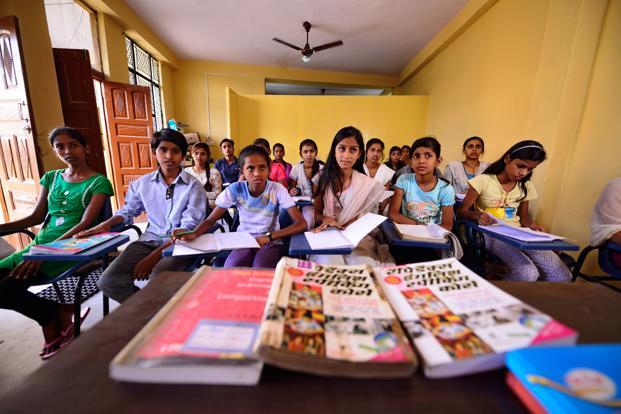The low hike in education budget was hinted at in the Economic Survey presented last month, which said the government does not have much fiscal space to spend big on social sectors including education. Photo: Pradeep Gaur/Mint
New Delhi: Finance minister Arun Jaitley said that education is a priority area for the government and allocated Rs85,010 crore for the sector for the year starting 1 April.
The budget allocation for 2018-19 is, however, less than 4% higher than the revised budget estimate of the current year. The 2017-18 budget estimate had pegged an outlay of Rs79,685.95 crore, which was later revised to Rs81,868 crore.
The low hike in the education outlay was hinted at in the Economic Survey presented last month, which said the government does not have much fiscal space to spend big on social sectors including education.
From a thematic point of view, the Union budget focused on two key areas of education—integration and fiscal accountability.
“We now propose to treat education holistically without segmentation from pre-nursery to Class XII,” the finance minister said in his budget speech.
This may mean that the Union government is working to integrate the school education sector—from pre-school to Class XII—implying the merger of several school schemes in the near future.
The human resource development ministry is working on a plan to integrate several flagship school schemes including the Sarva Shiksha Abhiyan (SSA), Rashtriya Madhyamik Shiksha Abhiyan (RMSA) and teacher education. As of now, SSA and RMAS have a joint mandate to make school education universal.
On fiscal accountability part, Jaitley said the country is looking to spend Rs1 trillion to revitalize the infrastructure of higher educational institutions.
In his Budget 2018 speech, Jaitley unveiled a new scheme called Revitalising Infrastructure and Systems in Education or RISE.
The RISE scheme will be financed via a restructured higher education financing agency (HEFA) that is functioning for the last two months as a non-banking financial company. It aims to lend low-cost funds to government higher educational institutions. Right now HEFA is looking to raise Rs20,000 crore and Thursday’s announcement hikes this number to Rs1 trillion.
While HEFA was granted a budgetary allocation of Rs250 crore in fiscal year 2018, in FY19, the lending body will be provided a budget of Rs2,750 crore.
HEFA was created to infuse fiscal discipline among government higher educational institutions and allow them to raise money and pay back from their own income. In a way, Budget 2018’s plan to expand HEFA will put in place a system where higher educational institutions will be borrowing from a dedicated organization instead of depending on grant money for each of their expenses.
Of the total education outlay for FY19, school education has got a lion share of Rs50,000 crore (nearly Rs3,000 crore more than the previous revised budget) and rest Rs35,010 crore has gone to the higher education sector.
In the school sector, SSA has been allocated a budget of Rs26,128 crore up from Rs23,500 crore in the previous budget. Similarly, RMSA will be provided with Rs4,213 crore, up by Rs300 crore from the previous budget. The flagship school meal programme of Mid-day-Meal will get Rs10,500 crore in FY19, an increase of Rs500 crore from the previous budget.
Even as the budget talked about setting up a chain of special schools for tribal students, it cut the allocation for both its marquee school chains of Kendriya Vidyalayas and Jawahar Navodaya Vidyalayas.
In the higher education space, the total budgetary allocation has been reduced for IITs—from Rs8,244.8 crore to Rs6,326 crore in 2018-19. There is a cut in the budget allocations to IIMs as well as the University Grants Commission.
Despite its digital education push, Budget 2018 has cut fund allocation for e-learning from Rs518 crore to Rs456 crore in FY19. However, it has pegged an allocation of Rs250 crore for the World Class Institutions plan.
“Holistic approach of school sector is a good move…on HEFA it would be interesting to see how they want to raise the fund. The capacity of academic institutions to repay loans (taken from HEFA) over a 10-year time horizon will be closely watched,” said Aurobindo Saxena, vice-president and head of education practice at consulting firm Technopak.
Meanwhile the budget on Thursday announced that the prevalent 3% education cess will be replaced with a 4% education and health cess. This will help the government garner Rs11,000 crore per annum from taxpayers.
[“Source-livemint”]








